| Reviews & Columns |
|
Reviews DVD TV on DVD Blu-ray 4K UHD International DVDs In Theaters Reviews by Studio Video Games Features Collector Series DVDs Easter Egg Database Interviews DVD Talk Radio Feature Articles Columns Anime Talk DVD Savant Horror DVDs The M.O.D. Squad Art House HD Talk Silent DVD
|
DVD Talk Forum |
|
|
| Resources |
|
DVD Price Search Customer Service #'s RCE Info Links |
|
Columns
|
|
|
Hunger (1983), The
Warner Archive // R // August 18, 2015
List Price: $21.99 [Buy now and save at Amazon]
The Film:
Mercifully, another cycle of vampire-film oversaturation seems to be coming to a close, slowly slipping back into the shadows until another book, television, or film series beckons its return. This time around, though, the popularity of a trashy pop-culture novel franchise drove filmmakers to attempt fresh and exciting things with the bloodsucker genre, counterbalancing a shoddy, sparkly teen romance with examples of what macabre supernatural drama can really accomplish. Long before the likes of Byzantium and Only Lovers Left Alive explored the emotional hardship and companionship of immortality, the vivid styling of Tony Scott tapped the vein of those ideas with The Hunger, the tale of an ancient pureblood vampire and her turned lovers whose eternal lives aren't quite as eternal as she promises. Unlike some of Scott's later action films that are overburdened by style, his debut feature actually elevates the pulse of this vampiric yarn with sensory triggers, ensnaring one's attention with melancholy eroticism before they get too distracted by its prolonged, cryptic attitude.
Director Scott commands an immensely high-caliber cast for his freshman feature, led by French screen legend Catherine Deneuve as Miriam Blaylock, a modern-day vampire whose existence can be traced back to ancient Egypt. For some time now, she's enjoyed the company of her human-vampire hybrid lover, John -- played by a pale, lithe David Bowie in a perfect bit of casting -- as the pair live out their days eternally fiddling with musical instruments, visiting night clubs, and feeding on the living. It seems to be a rewarding enough routine for them until John starts to show the effects of rapid aging, revealing the dishonesty of Miriam's proposal of everlasting life to him. As John deteriorates, Miriam quietly seeks a replacement for him in research doctor Sarah Roberts (Susan Sarandon), whose experiments with blood and life extension on primates suggest that she might be a more understanding contemporary companion than others. Easier said than done in modern times, though.
From the start, director Scott uses the gothic sensibilities of The Hunger to experiment with his flair for composition and raucous editing, embracing ambitious style over substance without veering away from the moderate intentions of the story. Certain artistic flourishes -- especially in the bold first act -- accomplish little beyond visceral stimulation, though, such as caged monkey violence juxtaposed with the first gory glimpse at this setting's take on vampire feeding, equal parts sensual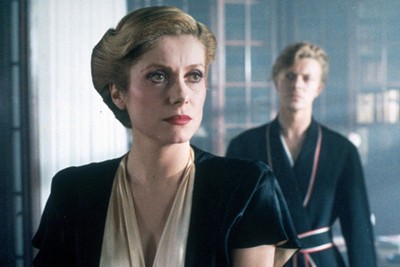 and animalistic. Looked at as a forward-moving story, not a lot really happens in this loose adaptation of Whitley Strieber's novel of the same name, so generating a pronounced mood based on the sensory aspects of other-worldly transformations -- losing immortality and gaining an appetite for human flesh -- becomes a crucial part of the narrative. John's deterioration might not make a whole lot of sense, let alone how he uses those precious last moments of his once-eternal youth, but Bowie looks sharp in a fedora and specks while waiting for his existence to run out in a shadowy and open-aired waiting room, a feast for the eyes due to the beauty of his approaching feebleness.
and animalistic. Looked at as a forward-moving story, not a lot really happens in this loose adaptation of Whitley Strieber's novel of the same name, so generating a pronounced mood based on the sensory aspects of other-worldly transformations -- losing immortality and gaining an appetite for human flesh -- becomes a crucial part of the narrative. John's deterioration might not make a whole lot of sense, let alone how he uses those precious last moments of his once-eternal youth, but Bowie looks sharp in a fedora and specks while waiting for his existence to run out in a shadowy and open-aired waiting room, a feast for the eyes due to the beauty of his approaching feebleness.
The Hunger leaves a lot of such things unanswered, striving for ambiguity within the stifled, chic walls of the vampires' apartment. Some are intentional curiosities for the audience to ponder on a mental level, while others simply neglect to establish coherent rules for the supernatural beings about death, weakness, and the state of their victims after feeding. The biggest mystery is Miriam herself, though, whose tastes in lovers and morbid motivations remain largely unclear as she transitions between companions. Catherine Deneuve sheds the burdened charms and warmth of her more noteworthy roles for this character's outright austerity, to a point where outsiders being drawn to her seems questionable because of her frigid thick-accented demeanor, an outlook that was born of something more supernatural than unsatisfied desire or the hard knocks of life. It's a beguiling, unsympathetic role for Deneuve that draws attention to some of the vagueness behind what Miriam's capable of doing, where the difficulty in comprehending why Dr. Roberts becomes drawn to her in such a short time plays into the film's supernatural eeriness and aphrodisia.
By the time Miriam begins her courtship, The Hunger had just begun to scratch the surface of its mythos, which makes the transition to Sarah's attraction to this mysterious woman both intoxicating and opaque in nature. Shades of other lesbian vampire flicks like Daughters of Darkness and The Vampire Lovers seep into the atmosphere of their provocative repartee, the unyielding persuasiveness of Miriam's company building to a deliberate, artful romantic tryst where the pretension of the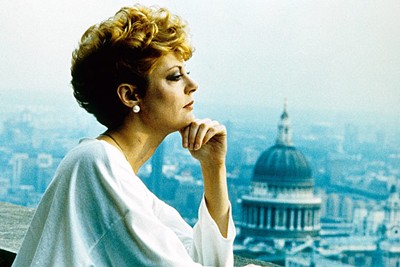 operatic "Flower Duet" playing in the background actually has some justification. The peaks of Susan Sarandon's performance linger in the moments where Sarah's caught between realms of existence thereafter, channeling some of the same bewildered innocence and curiosity she brought to Rocky Horror Picture Show into the doctor's shift in perception, tweaking her tastebuds and how she views the human form. There's a degree of mischievous allegory going on underneath Scott's mix of arty sensibility and overt titillation, something that's taken just seriously enough amid the sleaze to grab one's attention.
operatic "Flower Duet" playing in the background actually has some justification. The peaks of Susan Sarandon's performance linger in the moments where Sarah's caught between realms of existence thereafter, channeling some of the same bewildered innocence and curiosity she brought to Rocky Horror Picture Show into the doctor's shift in perception, tweaking her tastebuds and how she views the human form. There's a degree of mischievous allegory going on underneath Scott's mix of arty sensibility and overt titillation, something that's taken just seriously enough amid the sleaze to grab one's attention.
What The Hunger ultimately lacks is a more pronounced reason for being, a convincing understanding of where Miriam's pursuits are headed beyond adding another companion to the history books. Director Scott ups the tension with the pervasive effects of her seduction and the obvious conflict between vampirism and science, reaching an unsettling endgame built around how Miriam has coped with her immortality all this time ... and whether she's ever really given her companions a choice in the matter. To the end, however, the film contently remains an intriguing yet vague horror trifle that's a little too self-satisfied with its enigmas, deliberately refusing to commit either to the schlocky thrills of the genre or more profound musings that might give it a stronger existential point. While spilled blood and decrepit cadavers end things on a mesmerizing and macabre note, especially when filtered through Scott's visual panache, the ponderous nature of The Hunger keeps it from sinking its teeth into something more meaningful.
The Blu-ray:
Video and Audio:
Warner's Archive line of on-demand Blu-ray catalog releases have done a bang-up job of presenting content that likely doesn't really need a full retail distribution, whether it's preserved black and white classics or '80s films like Deathtrap and Ladyhawke. The Hunger joins those other successful efforts from the era in a 2.35:1-framed, 1080p AVC transfer of Stephen Goldblatt's rich, moody cinematography, capturing Tony Scott's colorful and highly-stylized aesthetic in a radiant transfer. Open spaces, hazy lighting, and eerie shadows create a unique look for the film that's preserved with shrewd contrast balance here. Shades of blood red, flowery yellow, and neon blue are vivid and skin tones are suitably warm, yet appropriately balanced against the cool lighting and other pastel shades. Bountiful fine detail emerges in close-ups and steady zooms/pans -- the weave of a veil and the marbling on walls, strands of hair and the curves of glasses -- sporting sharp lines and contours against the complex lighting. Grain and compression can be a tad heavy in spots, notably erratic in deeper shadows on the sides of the image, and some film flickering becomes visible in several brighter interior shots. That said, these are minor setbacks that are easily offset by the immense strengths in how the Archives preserved the beauty of Scott's premiere film in HD.
Carrying over similar limitations to the DVD presentation, the 2.0 DTS-HD Master Audio track paired with the largely impressive transfer is the very definition of serviceable, never sounding like much of an uptick over a standard Dolby representation of a mono recording expanded into stereo. Separation doesn't really factor into the equation then, obviously, a drawback that's accentuated by the hollow, dated fidelity of street traffic, orchestral music, and laboratory sound effects. Verbal clarity manages to keep the dialogue articulate and somewhat natural, even though it also feels strained under the weight of the film's age, while the shrill distorted-reality sound effects and the strumming of stringed instruments are comfortably resonant at midrange levels. The subtle effects of fingers being rubbed together and echoing voices display more dimension than one might expect from the flawed track, though, and the stillness of sequences keeps hiss and distortion mostly under control. It's not a strong track, really, but it hits the right atmospheric beats. English subtitles are available.
Special Features:
Warner Bros. ditched the stills gallery from their original DVD presentation, but they made sure to port over the Audio Commentary with Tony Scott and Susan Sarandon that appeared on it, featuring the pair in separate recordings that have been edited together into a single track. The overall length of Sarandon's participation, while providing interesting insights about the edginess of the film and the suggestions she made about the seduction sequence, is relatively small compared to the bulk of Scott's mostly general discussion throughout about what drew him to the project, how he imparted his commercial style on the film, and the participation and post-Hunger growth of the cast and crew. Scott's frankness about the film's initial reception is refreshing, as is his discussion about the transformed shooting locations and the research poured into the science of life longevity, but the wide gaps of silence and the low-key, broad nature of the track drag down the tempo.
A Theatrical Trailer (2:05, 16x9 HD) has also been included.
Final Thoughts:
Tony Scott attempted to hit a middle-ground in his feature debut, The Hunger, between the essence of European erotic vampire cinema and macabre arthouse sensibilities, elevated by his expressive and graphical style of commercial imagery. He doesn't quite get there, getting lost in creative indulgence and shallow intentions for the supernatural drama, but an effective streak of fantastical eroticism and immediacy towards mortality gives it a worthwhile entrancing quality. The performances play to the actors' native charismas as Scott's confident visual flair captures them in moody lighting and surreal angles, where the progression through rapid aging, other-worldly seduction, and vampiric transformation culminates into an intriguing horror experiment, managing to be both eccentric and reserved at the same time. WB's Archive Blu-ray offers a rather splendid high-definition transfer alongside a mediocre soundtrack and a reused commentary. Recommended.
Thomas Spurlin, Staff Reviewer -- DVDTalk Reviews | Personal Blog/Site
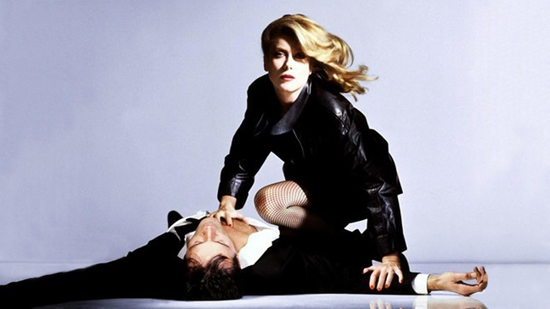 |
Mercifully, another cycle of vampire-film oversaturation seems to be coming to a close, slowly slipping back into the shadows until another book, television, or film series beckons its return. This time around, though, the popularity of a trashy pop-culture novel franchise drove filmmakers to attempt fresh and exciting things with the bloodsucker genre, counterbalancing a shoddy, sparkly teen romance with examples of what macabre supernatural drama can really accomplish. Long before the likes of Byzantium and Only Lovers Left Alive explored the emotional hardship and companionship of immortality, the vivid styling of Tony Scott tapped the vein of those ideas with The Hunger, the tale of an ancient pureblood vampire and her turned lovers whose eternal lives aren't quite as eternal as she promises. Unlike some of Scott's later action films that are overburdened by style, his debut feature actually elevates the pulse of this vampiric yarn with sensory triggers, ensnaring one's attention with melancholy eroticism before they get too distracted by its prolonged, cryptic attitude.
Director Scott commands an immensely high-caliber cast for his freshman feature, led by French screen legend Catherine Deneuve as Miriam Blaylock, a modern-day vampire whose existence can be traced back to ancient Egypt. For some time now, she's enjoyed the company of her human-vampire hybrid lover, John -- played by a pale, lithe David Bowie in a perfect bit of casting -- as the pair live out their days eternally fiddling with musical instruments, visiting night clubs, and feeding on the living. It seems to be a rewarding enough routine for them until John starts to show the effects of rapid aging, revealing the dishonesty of Miriam's proposal of everlasting life to him. As John deteriorates, Miriam quietly seeks a replacement for him in research doctor Sarah Roberts (Susan Sarandon), whose experiments with blood and life extension on primates suggest that she might be a more understanding contemporary companion than others. Easier said than done in modern times, though.
From the start, director Scott uses the gothic sensibilities of The Hunger to experiment with his flair for composition and raucous editing, embracing ambitious style over substance without veering away from the moderate intentions of the story. Certain artistic flourishes -- especially in the bold first act -- accomplish little beyond visceral stimulation, though, such as caged monkey violence juxtaposed with the first gory glimpse at this setting's take on vampire feeding, equal parts sensual
 and animalistic. Looked at as a forward-moving story, not a lot really happens in this loose adaptation of Whitley Strieber's novel of the same name, so generating a pronounced mood based on the sensory aspects of other-worldly transformations -- losing immortality and gaining an appetite for human flesh -- becomes a crucial part of the narrative. John's deterioration might not make a whole lot of sense, let alone how he uses those precious last moments of his once-eternal youth, but Bowie looks sharp in a fedora and specks while waiting for his existence to run out in a shadowy and open-aired waiting room, a feast for the eyes due to the beauty of his approaching feebleness.
and animalistic. Looked at as a forward-moving story, not a lot really happens in this loose adaptation of Whitley Strieber's novel of the same name, so generating a pronounced mood based on the sensory aspects of other-worldly transformations -- losing immortality and gaining an appetite for human flesh -- becomes a crucial part of the narrative. John's deterioration might not make a whole lot of sense, let alone how he uses those precious last moments of his once-eternal youth, but Bowie looks sharp in a fedora and specks while waiting for his existence to run out in a shadowy and open-aired waiting room, a feast for the eyes due to the beauty of his approaching feebleness. The Hunger leaves a lot of such things unanswered, striving for ambiguity within the stifled, chic walls of the vampires' apartment. Some are intentional curiosities for the audience to ponder on a mental level, while others simply neglect to establish coherent rules for the supernatural beings about death, weakness, and the state of their victims after feeding. The biggest mystery is Miriam herself, though, whose tastes in lovers and morbid motivations remain largely unclear as she transitions between companions. Catherine Deneuve sheds the burdened charms and warmth of her more noteworthy roles for this character's outright austerity, to a point where outsiders being drawn to her seems questionable because of her frigid thick-accented demeanor, an outlook that was born of something more supernatural than unsatisfied desire or the hard knocks of life. It's a beguiling, unsympathetic role for Deneuve that draws attention to some of the vagueness behind what Miriam's capable of doing, where the difficulty in comprehending why Dr. Roberts becomes drawn to her in such a short time plays into the film's supernatural eeriness and aphrodisia.
By the time Miriam begins her courtship, The Hunger had just begun to scratch the surface of its mythos, which makes the transition to Sarah's attraction to this mysterious woman both intoxicating and opaque in nature. Shades of other lesbian vampire flicks like Daughters of Darkness and The Vampire Lovers seep into the atmosphere of their provocative repartee, the unyielding persuasiveness of Miriam's company building to a deliberate, artful romantic tryst where the pretension of the
 operatic "Flower Duet" playing in the background actually has some justification. The peaks of Susan Sarandon's performance linger in the moments where Sarah's caught between realms of existence thereafter, channeling some of the same bewildered innocence and curiosity she brought to Rocky Horror Picture Show into the doctor's shift in perception, tweaking her tastebuds and how she views the human form. There's a degree of mischievous allegory going on underneath Scott's mix of arty sensibility and overt titillation, something that's taken just seriously enough amid the sleaze to grab one's attention.
operatic "Flower Duet" playing in the background actually has some justification. The peaks of Susan Sarandon's performance linger in the moments where Sarah's caught between realms of existence thereafter, channeling some of the same bewildered innocence and curiosity she brought to Rocky Horror Picture Show into the doctor's shift in perception, tweaking her tastebuds and how she views the human form. There's a degree of mischievous allegory going on underneath Scott's mix of arty sensibility and overt titillation, something that's taken just seriously enough amid the sleaze to grab one's attention. What The Hunger ultimately lacks is a more pronounced reason for being, a convincing understanding of where Miriam's pursuits are headed beyond adding another companion to the history books. Director Scott ups the tension with the pervasive effects of her seduction and the obvious conflict between vampirism and science, reaching an unsettling endgame built around how Miriam has coped with her immortality all this time ... and whether she's ever really given her companions a choice in the matter. To the end, however, the film contently remains an intriguing yet vague horror trifle that's a little too self-satisfied with its enigmas, deliberately refusing to commit either to the schlocky thrills of the genre or more profound musings that might give it a stronger existential point. While spilled blood and decrepit cadavers end things on a mesmerizing and macabre note, especially when filtered through Scott's visual panache, the ponderous nature of The Hunger keeps it from sinking its teeth into something more meaningful.
The Blu-ray:
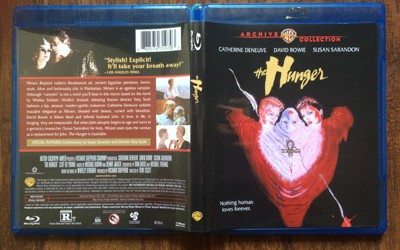 | 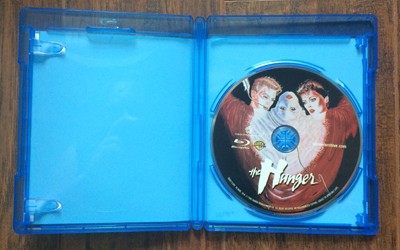 |
Video and Audio:
Warner's Archive line of on-demand Blu-ray catalog releases have done a bang-up job of presenting content that likely doesn't really need a full retail distribution, whether it's preserved black and white classics or '80s films like Deathtrap and Ladyhawke. The Hunger joins those other successful efforts from the era in a 2.35:1-framed, 1080p AVC transfer of Stephen Goldblatt's rich, moody cinematography, capturing Tony Scott's colorful and highly-stylized aesthetic in a radiant transfer. Open spaces, hazy lighting, and eerie shadows create a unique look for the film that's preserved with shrewd contrast balance here. Shades of blood red, flowery yellow, and neon blue are vivid and skin tones are suitably warm, yet appropriately balanced against the cool lighting and other pastel shades. Bountiful fine detail emerges in close-ups and steady zooms/pans -- the weave of a veil and the marbling on walls, strands of hair and the curves of glasses -- sporting sharp lines and contours against the complex lighting. Grain and compression can be a tad heavy in spots, notably erratic in deeper shadows on the sides of the image, and some film flickering becomes visible in several brighter interior shots. That said, these are minor setbacks that are easily offset by the immense strengths in how the Archives preserved the beauty of Scott's premiere film in HD.
Carrying over similar limitations to the DVD presentation, the 2.0 DTS-HD Master Audio track paired with the largely impressive transfer is the very definition of serviceable, never sounding like much of an uptick over a standard Dolby representation of a mono recording expanded into stereo. Separation doesn't really factor into the equation then, obviously, a drawback that's accentuated by the hollow, dated fidelity of street traffic, orchestral music, and laboratory sound effects. Verbal clarity manages to keep the dialogue articulate and somewhat natural, even though it also feels strained under the weight of the film's age, while the shrill distorted-reality sound effects and the strumming of stringed instruments are comfortably resonant at midrange levels. The subtle effects of fingers being rubbed together and echoing voices display more dimension than one might expect from the flawed track, though, and the stillness of sequences keeps hiss and distortion mostly under control. It's not a strong track, really, but it hits the right atmospheric beats. English subtitles are available.
Special Features:
Warner Bros. ditched the stills gallery from their original DVD presentation, but they made sure to port over the Audio Commentary with Tony Scott and Susan Sarandon that appeared on it, featuring the pair in separate recordings that have been edited together into a single track. The overall length of Sarandon's participation, while providing interesting insights about the edginess of the film and the suggestions she made about the seduction sequence, is relatively small compared to the bulk of Scott's mostly general discussion throughout about what drew him to the project, how he imparted his commercial style on the film, and the participation and post-Hunger growth of the cast and crew. Scott's frankness about the film's initial reception is refreshing, as is his discussion about the transformed shooting locations and the research poured into the science of life longevity, but the wide gaps of silence and the low-key, broad nature of the track drag down the tempo.
A Theatrical Trailer (2:05, 16x9 HD) has also been included.
Final Thoughts:
Tony Scott attempted to hit a middle-ground in his feature debut, The Hunger, between the essence of European erotic vampire cinema and macabre arthouse sensibilities, elevated by his expressive and graphical style of commercial imagery. He doesn't quite get there, getting lost in creative indulgence and shallow intentions for the supernatural drama, but an effective streak of fantastical eroticism and immediacy towards mortality gives it a worthwhile entrancing quality. The performances play to the actors' native charismas as Scott's confident visual flair captures them in moody lighting and surreal angles, where the progression through rapid aging, other-worldly seduction, and vampiric transformation culminates into an intriguing horror experiment, managing to be both eccentric and reserved at the same time. WB's Archive Blu-ray offers a rather splendid high-definition transfer alongside a mediocre soundtrack and a reused commentary. Recommended.
|
| Popular Reviews |
| Sponsored Links |
|
|
| Sponsored Links |
|
|
| Release List | Reviews | Shop | Newsletter | Forum | DVD Giveaways | Blu-Ray | Advertise |
|
Copyright 2024 DVDTalk.com All Rights Reserved. Legal Info, Privacy Policy, Terms of Use,
Manage Preferences,
Your Privacy Choices | |||||||














